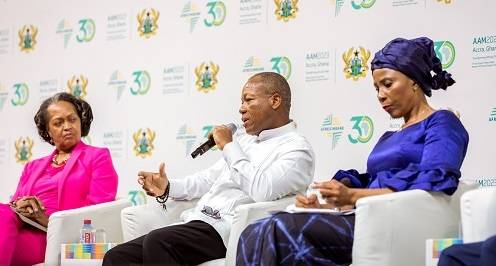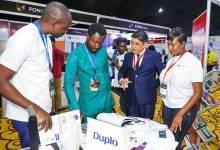
Mr Kwamina Duker, the Chief Executive Officer of Development Bank Ghana, has reiterated his outfit’s commitment to supporting and building bankable and competitive local businesses that can pit their strength against consumer alternatives coming mostly from foreign markets.
He was speaking at the 30th annual meeting of the African Export-Import Bank (Afreximbank) in Accra as a panellist during a plenary discussion with other distinguished industry captains, development experts and policy makers on the topic “Leveraging the Power of Intra-African Trade for Commodity Based Industrialisation”.
The panel discussions, which were part of a series of sessions at the gathering, sought to highlight the peculiar challenges that beset African economies when it comes to adding value to the extracted raw materials before being exported to foreign markets.
The objective of the discussions was to find ways to break the cycle of exporting unfinished goods and importing finished products much to the detriment of the respective African economies, and also on how to take control of Africa’s commodities and expand the value chain systems so as to be able to create the necessary socio-economic development.
Addressing how small to medium size enterprises are being integrated into the industrialisation process, Mr Duker indicated that for a very long time, the focus had been on the extractive sector and that had caused little investment into human capital, thus denying the opportunity of moving up the value chain.
According to DBG’s Chief Executive Officer, “moving up the value chain is critical but also complex because once you move up from the extraction or the out-grower phase, you come into the market forces phase which you must be able to respect in order to thrive”.
“For us as a development bank, we are focused on changing mindsets of the local businesses and making them bankable businesses that can be competitive on the global market,” he said.
He explained that it was essential for businesses that have been able to move up the value chain to have a mindset to compete, especially due to alternatives consumers were presented with on the market.
In addition, Mr Duker emphasised the importance of setting a “criteria for success” for local businesses, where businesses after a period of receiving support
must be able to take-off and run by themselves so as to achieve sustainable prosperity. According to him, this will be a measure of success of the investment placed into such businesses.
Other panellists for the session on “Leveraging the Power of Intra-African Trade for Commodity Based Industrialisation” were Professor Théophile T. Azomahou, Executive Director, Africa Economic Research Consortium, Dr Carlos Lopez, a Professor at the University of Cape Town, Ms Florie Liser, President & CEO, Corporate Council on Africa, Ms Ahunna Eziakonwa, UNDP Assistant Administrator & Regional Director for Africa, Mr Antonio Pedro, Acting Secretary, United Nations Economic Commission for Africa, and Mrs Kanayo Awani, Executive Vice President, Intra-African Trade, Afreximbank.
BY KINGSLEY ASARE







